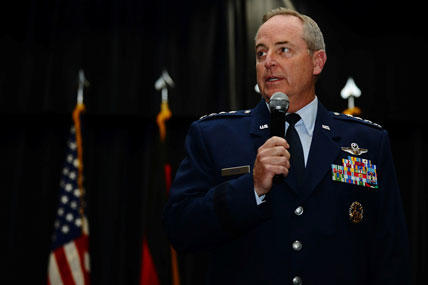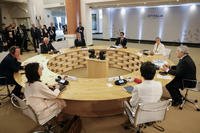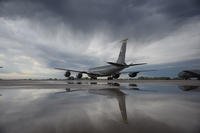Retired Air Force Lt. Gen. Frank Klotz said he can remember when Congress and the Secretary of Defense had last questioned the Air Force’s credibility. Airmen at Minot Air Force Base, N.D., had lost track of six nuclear warheads in 2007 before mistakenly flying them across the country.
Former Defense Secretary Robert Gates sacked the service’s top two leaders. The ones who replaced them, Air Force Chief of Staff Gen. Norton Schwartz and Air Force Secretary Michael Donley, faced a barrage of questions from congressional panels asking if the country could trust the service to watch over America’s most powerful weapon.
Five years later, the Air Force is facing another crisis of credibility within the halls of Congress. Nothing as drastic as misplacing six nuclear warheads, but friction exists between the Air Force and Capitol Hill at a time when the looming threat of sequestration and a $487 billion cut to planned spending could put many defense programs at risk.
Schwartz’s successor, Gen. Mark A. Welsh III, acknowledged a “trust problem” exists between the Air Force and Congress during his confirmation hearing in July. Sen. Lindsey Graham, R-S.C., agreed with Welsh.
“Your intel is good,” the senator told Welsh at the hearing.
Schwartz and Donley have since admitted shortcomings in their level of communication with Congress prior to introducing force structure cuts within their 2013 budget proposal that levied more drastic personnel and aircraft reductions on the Air National Guard than the active duty.
Lawmakers, whose states stood to lose aircraft and airmen, stood up and ripped the service during hearings questioning the leadership’s logic and decision-making while demanding a litany of reports to explain how retiring or transferring aircraft and missions out of the Guard would save money.
Donely explained the Air Force has reached a “place that we cannot stay” in respect to adapting the Air Force’s force structure to meet the reduction of expected defense spending over the next decade. Schwartz has told Congress he’d gladly avoid cutting the Guard, but it must come with the corresponding funding.
“Our focus was on striking the right balance,” Donley said at a breakfast at the Capitol Hill Club on July 25.
Congress has threatened to stand up a committee to evaluate the balance of the Air Force’s active duty, Reserve and Guard force structure. The Air Force proposed in its budget submission to Congress to cut 5,100 Guard, 900 Reserve, and 3,100 active-duty personnel. No other service faces such a committee.
Donley warned about the risks of politicizing the cuts the service can make, saying it would reduce readiness and the service’s war fighting capabilities. The Air Force is forced to make trades between modernization and personnel when it comes time to cut the service’s future budgets. Neither is a comfortable choice, but it’s the new fiscal reality inside the Pentagon, Donley explained.
It’s these trades in which the Air Force will depend on congressional support to approve. Welsh, who takes command of the Air Force on Friday, has said improving the service’s relationship with Congress is one of his top priorities.
The Air Force has failed to play the politics game on Capitol Hill, said Loren Thompson, a defense industry consultant. Where the Air Force failed in the recent round of budget hearings is warning Congress about the cuts and making sure they had the Hill’s support, Thompson explained.
He pointed to the anger heard in some of the questions Welsh received during his confirmation hearing before the Senate. Sen. John Cornyn, R-Texas, went further and initially refused to approve Welsh’s nomination citing his concerns with the Air Force’s response to the sexual assault scandal at Lackland Air Force Base, Texas.
Cornyn released his hold on Welsh’s confirmation Aug. 2 after meeting with the Air Force four-star general, but it provided the most recent example of friction that exists between the Air Force and Congress.
Not every lawmaker has raised problems with the service. The ranking member of the House Intelligence Committee described his relationship with the Air Force as healthy, commending the service for its commitment in working with him on cyber security and space situational awareness.
“I know about the issues with the Guard, but I have enjoyed working with the Air Force leadership and General Schwartz,” said U.S. Rep. C.A. “Dutch” Ruppersberger, D-Md.
Welsh said he plans on building more of these relationships and reaching out to organizations such as the National Guard Bureau and the Council of Governors, which led a lobbying effort to strike down the Air Force’s proposed cuts to the Air National Guard.
“[The budget process] has to include better coordination and information sharing not just with the Air National Guard or the Air Force Reserve, but with the National Guard Bureau, and clearly the link between the National Guard Bureau and Council of Governors has got to be energized in a more meaningful and productive way,” Welsh said.





























